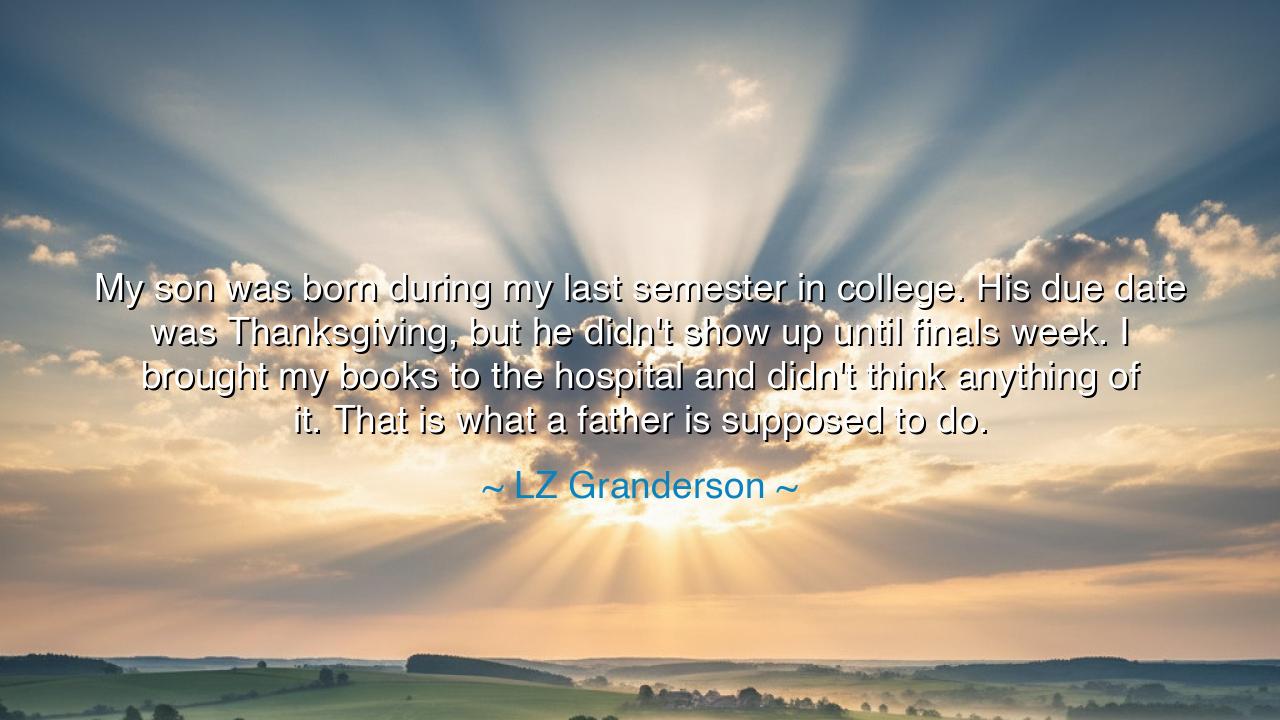
My son was born during my last semester in college. His due date
My son was born during my last semester in college. His due date was Thanksgiving, but he didn't show up until finals week. I brought my books to the hospital and didn't think anything of it. That is what a father is supposed to do.






LZ Granderson once spoke with humility and strength: “My son was born during my last semester in college. His due date was Thanksgiving, but he didn’t show up until finals week. I brought my books to the hospital and didn’t think anything of it. That is what a father is supposed to do.” In these words lies the portrait of devotion, sacrifice, and responsibility. It is a testimony that true fatherhood is not found in grand gestures or lofty words, but in the steady weaving together of duty and love.
The origin of this saying rests in Granderson’s own life, as both a journalist and a father who faced the challenge of balancing education with parenthood. For many, the weight of college studies alone is enough to bend the shoulders. Yet here, in the midst of looming exams and the birth of his first child, he bore both burdens without complaint. His reflection, told years later, was not meant to glorify himself but to teach a simple truth: that a father’s duty is not negotiable, and love requires both presence and perseverance.
This truth echoes through the ages. Consider the story of Marcus Aurelius, the philosopher-emperor, who wrote his Meditations while leading armies at the edge of the empire. He bore the crown of Rome and the private weight of family grief, yet he never abandoned his duties as father and as ruler. Like Granderson, he understood that one cannot wait for life to be convenient before fulfilling obligations. Duty must be carried even in the midst of storms, whether on battlefields or in hospital rooms.
The mention of Thanksgiving and finals week gives this memory both symbolic and practical weight. Thanksgiving is the season of gratitude, the time when families gather to honor life’s blessings. Finals are the season of testing, when discipline and endurance are measured. Granderson’s son arrived not at the appointed due date of gratitude, but at the hour of testing—and in that moment, the young father embraced both blessings and trials together. He studied even as he waited for his child to draw his first breath, proving that love does not excuse us from discipline, and discipline does not excuse us from love.
There is wisdom in his casual tone: “I didn’t think anything of it.” For what may seem extraordinary to others, he saw as ordinary duty. This humility reflects the truest spirit of service. The soldier who rushes into danger does not call himself a hero; he calls it his job. The parent who sacrifices sleep for a child does not boast; they call it love. Granderson’s words remind us that greatness often hides beneath simplicity, that the noblest acts are often done quietly, without the need for recognition.
The lesson here is powerful: responsibility and love must walk together. Do not wait for perfect timing or easy circumstances to fulfill your duties. When family calls, answer. When work demands, endure. When both come at once, bear them together with courage. This is what it means to be steadfast, to be the anchor in times of storm. For children do not remember the awards their parents won, but the faithfulness with which they were present.
So, O listener, take this teaching into your own life. Whether you are a parent, a friend, a leader, or a student, know that life will often test you with conflicting demands. Do not despair, and do not choose love or duty as if they are rivals. Choose both, and carry them together, for that is the mark of true character. Let Granderson’s example guide you: when the tests of life arrive at the same hour as the blessings, rise to meet both. For this is what it means not only to be a father, but to be fully human—steadfast, humble, and true.






AAdministratorAdministrator
Welcome, honored guests. Please leave a comment, we will respond soon